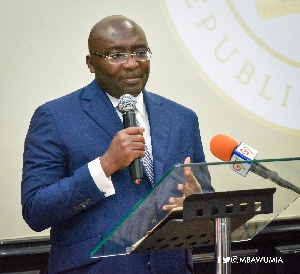Vice-President Dr Mahamudu Bawumia, who heads the Akufo-Addo government’s Economic Management Team, on 3 April 2019, will address Ghanaians on the state of the economy at a town hall meeting on the theme: “Our progress, our status, our future”.
The event is billed for the College of Physicians and Surgeons in the national capital, Accra.
It forms part of a new initiative announced by the Information Ministry.
The main opposition National Democratic Congress and its Minority in parliament have been yearning to hear from Dr Bawumia, especially, as the local currency, the cedi, takes a beating from the dollar and other major international currencies of trade.
On Wednesday, 20 March 2019, for instance, the Minority said within a space of two years, the Akufo-Addo government has added GHS80 billion to Ghana’s debt stock, adding that the fall of the local currency alone, added GHS15.3 billion to the bill.
The tottering cedi almost hit the $1: GHS6 mark this month but made some gains to hover at $1: GHS5.65 after the Bank of Ghana pumped some $800 million into the system.
According to the Minority in parliament, the fall in the cedi essentially means Ghana’s external debt stock, as of November 2018, shot up to GHS101.3 billion at the current exchange rate.
At a roundtable on Wednesday on the theme: ‘An Encounter with the Minority on the state of Ghana’s economy’, the Caucus’ spokesperson on finance, Cassiel Ato Forson, with reference to the 2019 budget, said: “All fiscal and financial estimates were made using a projected Cedi/Dollar exchange of GHS4.8 per Dollar. Currently, the Cedi/Dollar exchange is quoted at GHS5.65 per Dollar. The implication is that all government loans that were expected to be serviced at the projected exchange rate of GHS4.8 have suddenly become more expensive”.
“The stock of total public debt has gone up significantly at the current cedi-dollar exchange rate of GHS5.65. In November 2018, the stock of total external debt as reported by the Bank of Ghana was US$18.014 billion.
“At the then exchange rate of GHS4.8 per dollar, the total external debt in local currency was GHS86.4 billion. Even if the government has not added anything to the stock of external debt over the last three months, which we all know is not possible, the US$18.0 billion external debt recorded in November 2018 will be translated at the current exchange rate into GHS101.3 billion.
“This means that without considering new borrowings by the government, the depreciation alone has added GHS15.3 billion to Ghana’s external debt.”
As of November 2018, the public debt stood at GHS172.9 billion. Per the Minority’s calculations, however, that figure balloons to GHS201.8 billion if the GHS15.3 billion debt incurred as a result of the cedi’s woes as well as the GHS13.6 billion bond issued to reform the banking sector, are added.
“This means that in barely two years, the NPP government has added about GH¢80 billion to the public debt stock,” the former deputy finance minister said.
Furthermore, Mr Forson posed five questions to Dr Bawumia as follows:
Question 1: Why would an independent central bank with focus on price stability decide to reduce the monetary policy rate against its own research findings that US policy normalisation is strengthening the US dollar and causing investors to move funds away from emerging economies and that upward adjustment in domestic prices of petroleum products are likely to affect transport and utility prices?
Question 2: Why would an independent central bank, with a focus on price stability, decide to lower the policy rate in the face of dwindling net international reserves and a rising interest rate abroad?
Question 3: Why would an independent central bank with a focus on price stability decide to reduce the monetary policy rate in favour of growth, which has been projected to be higher than the previous year’s, while the local currency is under pressure?
Question 4: Why would an independent central bank with a focus on price stability decide to lower the policy rate in the face of excess liquidity in the banking sector emanating from banks increasing their minimum paid-up capital by over 100 per cent, while the local currency is fast depreciating?
Question 5: Clearly, an economy cannot be externally unstable and internally stable. How can a rapid exchange rate depreciation be accompanied with a single digit inflation rate as captured by the posted macroeconomic indicators?
Business News of Thursday, 21 March 2019
Source: classfmonline.com

















